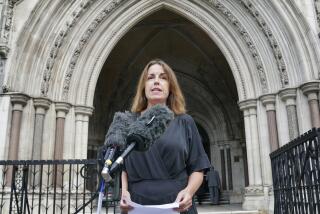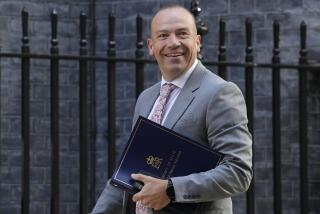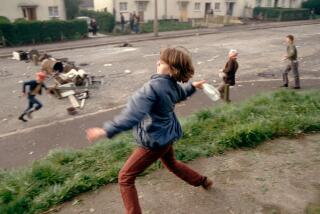Secrecy, Delays Cloud Look at Slayings by British Forces
- Share via
BELFAST, Northern Ireland — British security forces have killed more than 300 people in the Northern Irish “troubles,” often in circumstances clouded by official secrecy and administrative delays.
Critics say authorities often suppress the truth to protect their undercover operations. For many in Northern Ireland, it’s an acceptable price for combatting the Irish Republican Army and other violent groups.
“The law-abiding community, when given the choice, would prefer to see dead terrorists rather than murdered innocents,” said the Rev. Ian Paisley, Protestant leader of the Democratic Unionist Party.
That view obscures a basic premise of Britain’s stated security policy--that its forces are not waging a war against an armed political opposition, but combatting criminal groups within the province’s Catholic and Protestant communities.
“I can understand why terrorists who are killed don’t get much sympathy. But that is no justification for killing someone who could have been arrested,” said Sir Oliver Napier, chairman of the government-appointed Standing Advisory Commission on Human Rights.
“The reaction of the authorities in Northern Ireland to disputed killings seems to be to close ranks and create numerous obstacles to establishing the truth,” according to a report by the Belfast-based Committee on the Administration of Justice, an independent pressure group.
The province’s police force, the Royal Ulster Constabulary, investigates each incident and submits a private report to the Northern Ireland director for public prosecutions, who decides whether to prosecute any security force members.
Of about 340 disputed security force killings in the last 23 years of civil disorder, there have been 28 prosecutions and two convictions. One soldier was given a suspended sentence for manslaughter, another was released after serving less than three years of a life sentence for murder.
Soldiers are now awaiting trial for the killing of two car-thieving “joy riders” in west Belfast in September, 1990, and an unarmed man in south Armagh in January, 1991.
“A trial of the soldiers or police involved would be the best hope of finding out the truth after a shooting, as they would be forced to undergo cross-examination,” said Michael Ritchie, a research officer for the Committee on the Administration of Justice.
“Short of that, inquests are supposed to be the venue where the information comes out to the public. But that doesn’t happen. Soldiers who have killed someone are not compelled to appear.”
The coroner’s inquest system permits soldiers and police to submit written statements, and juries are barred from deciding whether a killing was lawful.
“The British must show they do try to arrest men, not mow them down in cold blood using undercover assassins,” said Father Denis Faul, an outspoken Catholic priest in County Tyrone. “Shoot-to-kill undermines the law. It means there is no law.”
Napier maintains that the major issue in such security-force “ambushes” is not their lawfulness but the dearth of official explanation afterward.
“Let’s face it, soldiers and police carry guns in Northern Ireland because the IRA is trying to shoot them and put bombs under their cars,” Napier said.
“When you’re confronting 10 people in a car park with Kalashnikovs, you can’t say, ‘Could you please drop your guns, I’m a member of the RUC.’ If you say that you’re dead.”
More to Read
Sign up for Essential California
The most important California stories and recommendations in your inbox every morning.
You may occasionally receive promotional content from the Los Angeles Times.










